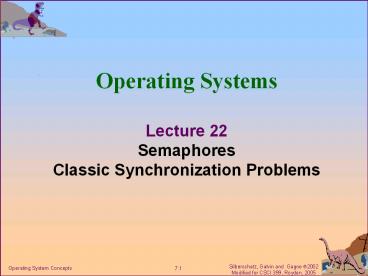Module 7: Process Synchronization - PowerPoint PPT Presentation
1 / 18
Title: Module 7: Process Synchronization
1
Operating SystemsLecture 22 Semaphores Classic
Synchronization Problems
2
Semaphores
- Synchronization tool that does not require busy
waiting. - Semaphore S integer variable
- can only be accessed via two indivisible (atomic)
operations (Note order of wait instructions
corrected from last set of slides). - wait (S)
- S--
- if (S lt 0) then block(P)
- signal (S)
- S
- if (S lt 0) then wakeup(P)
3
Critical Section of n Processes
- Shared data
- semaphore mutex //initially mutex 1
- Process Pi do wait(mutex)
critical section - signal(mutex) remainder section
while (1)
4
Questions about Semaphore
- Suppose mutex is initialized to 1.
- What does mutex 1 mean?
- What does mutex 0 mean?
- What does mutex lt 0 mean?
- When should mutex be initialized to value gt 1?
5
Semaphore Implementation
- Define a semaphore as a record
- typedef struct
- int value struct process L
semaphore - Assume two simple operations
- block suspends the process that invokes it.
- wakeup(P) resumes the execution of a blocked
process P.
6
Implementation
- Semaphore operations now defined as
- void wait(semaphore S) S.value--
- if (S.value lt 0)
- add this process to S.L block( )
- void signal(semaphore S) S.value
- if (S.value lt 0)
- remove a process P from S.L wakeup(P)
7
Notes on Implementation
- If the semaphore has a negative value, the
magnitude of the value indicates the number of
processes waiting on that semaphore. - One can use a FIFO queue to ensure bounded
waiting. (A LIFO queue can lead to starvation). - The wait and signal must be executed atomically.
- In a single processor environment, can disable
interrupts during the wait and signal function
calls. - In a multiprocessor environment, can use a
solution to the critical section problem
discussed earlier. Either a hardware solution
(e.g. TestAndSet) if available, or a software
solution.
8
What is the Problem here?
- .
- Let S and Q be two semaphores initialized to 1
- P0 P1
- wait(S) wait(Q)
- wait(Q) wait(S)
- ? ?
- signal(S) signal(Q)
- signal(Q) signal(S)
9
Two Types of Semaphores
- Counting semaphore integer value can range over
an unrestricted domain. - Binary semaphore integer value can range only
between 0 and 1 can be simpler to implement. - Can implement a counting semaphore S as a binary
semaphore.
10
Implementing S as a Binary Semaphore
- Data structures
- binary-semaphore S1, S2
- int C
- Initialization
- S1 1
- S2 0
- C initial value of semaphore S
11
Implementing S
- wait operation
- wait (S)
- wait(S1)
- C--
- if (C lt 0)
- signal(S1)
- wait(S2)
- signal(S1)
- signal operation
- signal (S)
- wait(S1)
- C
- if (C lt 0)
- signal(S2)
- else
- signal(S1)
12
Bounded-Buffer Problem
- Assume n buffer slots for data
- Shared datasemaphore full, empty,
mutexInitiallyfull 0, empty n, mutex 1
13
Bounded-Buffer Problem Producer Process
- do
- produce an item in nextp
- wait(empty)
- wait(mutex)
- add nextp to buffer
- signal(mutex)
- signal(full)
- while (1)
14
Bounded-Buffer Problem Consumer Process
- do
- wait(full)
- wait(mutex)
- remove an item from buffer to nextc
- signal(mutex)
- signal(empty)
- consume the item in nextc
- while (1)
15
Readers-Writers Problem
- Shared datasemaphore mutex, wrt
- int readcountInitiallymutex 1, wrt 1,
readcount 0 - Writer's code
- wait(wrt)
- writing is performed
- signal(wrt)
16
Readers-Writers Problem Reader Process
- wait(mutex)
- readcount
- if (readcount 1)
- wait(wrt)
- signal(mutex)
- reading is performed
- wait(mutex)
- readcount--
- if (readcount 0)
- signal(wrt)
- signal(mutex)
17
Dining-Philosophers Problem
- Shared data
- semaphore chopstick5
- Initially all values are 1
18
Dining-Philosophers Problem
- Philosopher i
- do
- wait(chopsticki)
- wait(chopstick(i1) 5)
- eat
- signal(chopsticki)
- signal(chopstick(i1) 5)
- think
- while (1)































